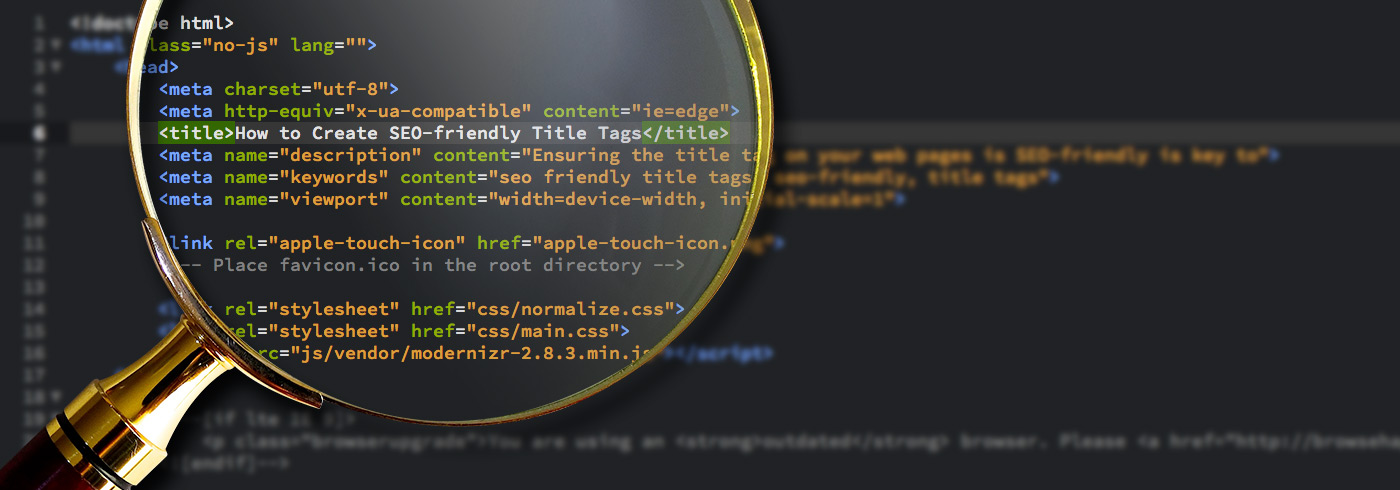


How to Create SEO-friendly Title Tags, Page Descriptions and Keywords
07/12/2016
Meta tags are HTML elements which provide information to search engines and visitors about your site content. We take a look at how to optimise Title, Description and Keyword tags for SEO.
Title Tags
The title tag defines the title of a document and is often used on search engine results pages. This tag provides an accurate summary of the page content and appears in three specific areas; external websites, browsers, and search engine results.
Browsers
Browsers often display the title tag in the tab at the top of a browser window.
Search engine results
Search engines often use the title tag of a web page in the listing when a user has performed a search.
External websites
External websites such as social media channels like Facebook and Twitter often use the title tag as the link to your site.
Writing a Good Title Tag
Length
Google typically displays the first 50-60 characters of a title tag or as many as it can fit in the 600px container. Keeping the title tag length under about 60 characters should ensure your title will display properly around 90% of the time. When a title tag is too long, it will be cut off with an ellipsis.
Keywords placement
Title tags should include the most important keywords you wish to rank for. The closer a keyword is to the start of a title tag, the more influential it will be with regard to the ranking of the web page and what users believe the page is relevant to. Search engines will highlight keywords in title tags in bold, if they match a search query.
Use of branding
Brand names should be used at the end of a title tag, although if the brand is well-known this should be placed at the beginning of the title tag as this is likely to be of greater value than the keywords used.
Avoid duplicating title tags
Title tags should be unique, and search engines may penalise pages for duplicate title tags.
Impact
The title tag is may well be one of the first things a potential customer sees with regard to your business if they find you online. With that in mind, use language that is positive and compelling to encourage users to click through to your page.
Optimal Format: Primary keyword - Secondary Keyword | Brand Name
Page Description
The page description is a short paragraph that summarises the content on your page. This description will appear under your website address in search results and is important in pulling users to your site.
Writing a good page description:
Keywords
Much like title tags, descriptions should include important keywords and be relevant to your page content. Again, search engines will highlight these words in bold if they match a search query.
Make it compelling
The description should be enticing and relevant to the page content, this is essential in getting users to click on your page.
Length
Descriptions can be any length but search engines generally cut these down after 160 characters, ending the description with an ellipsis. Long descriptions are not necessarily bad, as an ellipsis in the right place could trigger the curiosity of the user to look at your page.
Avoid duplicating descriptions
Like title tags it important that the description tag is unique. Google may penalise pages for duplicate descriptions.
Quotes cut of descriptions
Whenever quotes are used in a description google will cut off the description, using only alphanumeric characters will prevent this. If quotes are important to your description you can use single quotes.
Keyword Tag
The keyword tag contains a series of keywords that are relevant to your site content. These keywords can be used by search engines to determine ranking. However the value of the keyword tags is now debatable. In the past this tag has been abused by site owners and marketers where the tag would be “stuffed” with keywords irrelevant to the site content in order to boost ranking.
Keywords should be used with caution, keep it short, avoid overstuffing and do not include words that are irrelevant to your site content.
